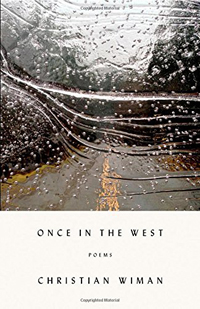Book Notes
 Christian Wiman, Once in the West: Poems (New York: Farrar, Straus, and Giroux, 2014), 105pp.
Christian Wiman, Once in the West: Poems (New York: Farrar, Straus, and Giroux, 2014), 105pp.
By Dan Clendenin
Christian Wiman's new book of poetry (his fourth) follows his memoir called My Bright Abyss; Meditation of a Modern Believer (2013). In that "mosaic" of "prose fragments," he explored his experience of falling in love in the shadow of death while trying to discover what assenting to his long latent faith means. "What I crave," he wrote, "is some speech that is true to the transcendent nature of grace yet equal to the hard reality in which daily faith operates." He sought both an "active devotion and honest modern consciousness." He wanted "to see the sanity and vitality of this strange, ancient thing" called Christian faith.
Wiman (b. 1966) is an American poet, the author of seven books, and from 2003 to 2013 was the editor of the journal Poetry, the oldest poetry magazine in the United States. On his thirty-ninth birthday, he was diagnosed with a rare form of cancer. His many treatments included a bone marrow transplant. At about the same time, Wiman fell madly in love and married his wife, Danielle. Today they have two children. Percolating underneath all of this was a long latent faith from his childhood days in West Texas. Today Wiman teaches at the Yale Divinity School and Yale Institute of Sacred Music.
These fifty-one poems continue Wiman's search for a God who is both too near and too far. Many of them reflect on his Texas childhood, and the people "who knew me when." Others describe his conversion and his cancer. All of them are characterized by brutal, emotional honesty.
On the one hand, we can experience terrifying pain, suffering, loneliness, and "the primal silence." The pious platitudes of a Sunday school faith are no help here, and Wiman can be acerbic when he describes our casual presumptions about the divine: "I mean to be mean," he writes. But this isn't the only thing we experience. We know moments of meaning, a "trace of peace," love in forsaken places like nursing homes, the "rockshriek of joy," and even an "attack of happiness."
"Is nothing pure?" he wonders. No, it's not. There are both Eros and Thanatos, meaning and meanness, love and hate, destruction and creation. Winter cold might have a "blind imperative to destroy," but when he looks more closely he sees its "bare abundance" and realizes that "one mite more would have been too much." Such is the surplus of meaning in the apparent meaninglessness. Memory's Mercies captures this paradox:
Memory's mercies
mostly aren'tbut there were
I swear
days
veined with gracelike a lucky
rock
ripping
electrically overwhatever water
there was —ten skips
twenty
in the telling:all the day's aches
eclipsedand a late sun
bellingeven sleeping Leroy
back
into his body
to smile
at some spirit-littank-rock
skimming the realso belongingly
no longing
clung to it
when it plungedbright as a firefly
into nowhere,I swear.
This is poetry that bears witness to the verisimilitude of faith in the face of death.
Dan Clendenin: dan@journeywithjesus.net


